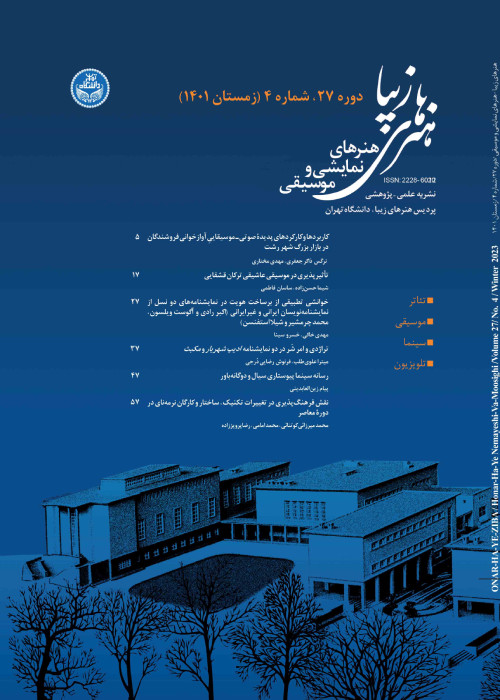Study of the Relationship "Self" and "other" At the beginning of Age of Modernism in Iran, In the play " Ja'far Khan az farang bargashteh" by "Hassan Mohaghdam"
This article deals with the encounter of “self” and “the “other” in the Iranian characters of the play Ja’far Khan is back from Europe by Hassan Moghaddam. This play is one of the most important plays of the early 20th century in Iran, and expresses the generation gap and the cultural differences between a very traditional Iranian family and their young son (Ja’far khan), who has recently come back to Iran after finishing his higher educations in Europe. The members of Ja’far khan’s family have made so many arrangements for the newcomer, and are extremely shocked to find out that Ja’far khan has totally changed to a person with European life style, and does not care about the Iranian traditions at all. His type of dressing, together with his ideology about abstaining from superstitions, are all quite new and unacceptable to his family. It is held in this article that the “self” and the “other” are among the most important “subject”s of the modern Iranian literature, which holds a bilateral relationship. This relationship creates an atmosphere in which the social and communicative forms are recreated as the sew “self” and “other” relations, and face each other in different arenas, of which the current play is an example. In other words, what this article focuses on, is the method of the arrangement of the characters of this play, according to some basic concepts such as language, dress and clothing, and the metaphoric and semiotic system of “self” and the “other”, which leads to the manifestation of the characters, and their different features. The ideologies of the characters of this play are studied with an analytic approach, and their discourse will be the major source of concern. Here, by discourse, we refer to the social approaches of each historical period during which the Iranian “self” and the experience of “the other” is created in this Iranian play. The results of the research show that the characters act as a type of subjectivity, and reveal their “self” characters when they face the “other”s. In the play Ja’far khan is back from Europe, the characters of the house act as “self”, and Ja’far khan acts as the “other”. As a matter of fact, the “self” people gradually turn Ja’far khan to an “other”, and this takes place as a result of the specific discourse which is a result of the social patterns of Iran in the time this play was composed. In this play, all the members of the family arrange their powers in a way that the person who used to belong to that house turns out to be an “other”. They first try to make this other similar to their own selves, and fail to compromise with Ja’far khan. Then they try to make themselves similar with that “other”, and they get no result other than surprise, carelessness, or anger, but they finally fail to make Ja’far khan the person he used to be before his dispatch to Europe for his studies.
- حق عضویت دریافتی صرف حمایت از نشریات عضو و نگهداری، تکمیل و توسعه مگیران میشود.
- پرداخت حق اشتراک و دانلود مقالات اجازه بازنشر آن در سایر رسانههای چاپی و دیجیتال را به کاربر نمیدهد.


